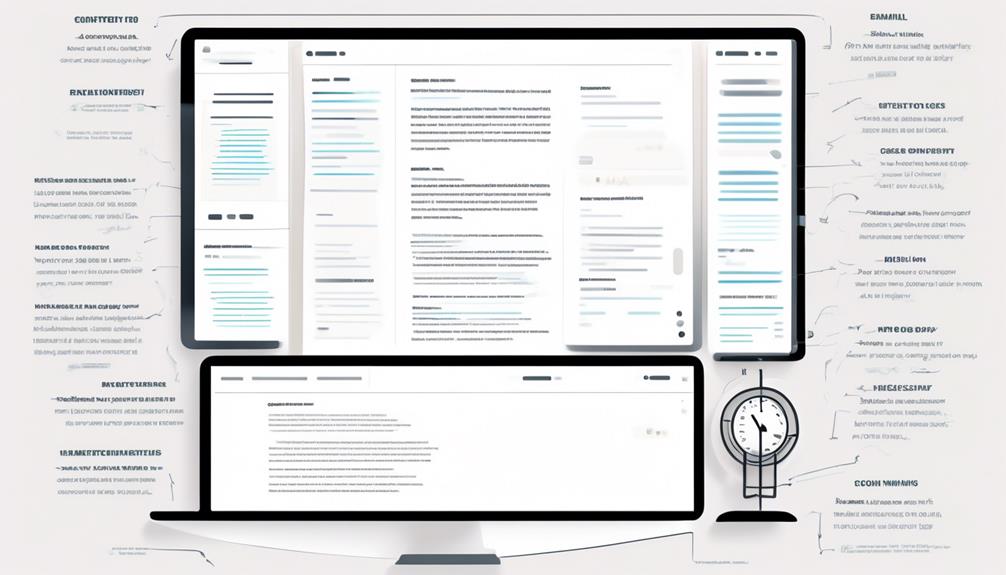When crafting an email to our supervisor, we often walk a fine line between showcasing professionalism and staying approachable. It’s like walking on a tightrope in the world of business, where every word holds considerable importance.
The art of composing a well-crafted email can sometimes be as crucial as face-to-face interactions in the office. So, how can we strike that delicate balance and ensure our emails to our bosses are effective and impactful?
Let’s explore some key strategies that can help us navigate this terrain and enhance our communication skills in the workplace.
Key Takeaways
- Maintain a respectful and professional tone in emails to your boss.
- Craft a clear and informative subject line to grab attention.
- Keep your message concise and to the point.
- Use email templates for efficient and effective communication with your boss.
Email Etiquette for Boss Communication
When communicating with your boss via email, it’s essential to maintain a tone that’s respectful and professional. Your emails should be concise, clear, and timely to ensure effective communication.
Start by crafting a subject line that summarizes the purpose of the email, such as ‘Request for Approval: Updated Work Schedule.’
In the body of the email, provide a brief overview of the request or update, including accurate data to support your points. For example, you could write, ‘Dear [Boss’s Name], I’m writing to request your approval on the updated work schedule for next week. The changes are aimed at improving efficiency and meeting project deadlines.’
Be sure to proofread your email for any errors before hitting send.
End your email with a clear call-to-action, such as asking for feedback or confirmation of receipt.
Key Elements in Email to Boss

Transitioning from the essential email etiquette guidelines for communicating with your boss, ensuring a professional and respectful tone remains paramount when considering the key elements in an email to your superior.
When crafting an email to your boss, there are key elements to keep in mind:
- Clear Structure: Organize your email with a clear introduction, main body, and conclusion for easy comprehension.
- Conciseness: Keep your message to the point, avoiding unnecessary details that may dilute the main purpose of the communication.
- Follow-up Plan: If needed, establish a follow-up plan in case there’s no response within a reasonable time frame.
Incorporating these elements into your email won’t only ensure a smooth transition from the initial contact but also facilitate effective and professional communication with your boss.
If you need to send a sample email to your boss, make sure to request a performance review or ask your boss for a meeting to discuss important matters promptly and professionally.
Various Scenarios and Templates
In tailoring our email style and content based on specific scenarios, utilizing email templates can significantly enhance communication efficiency and effectiveness with our boss.
When requesting time to discuss progress or seeking a meeting with your boss, a template can provide a structured format to convey your message professionally.
Templates for updating work progress can help in presenting information clearly and concisely, ensuring your boss is informed without overwhelming them with unnecessary details.
Moreover, when transitioning responsibilities or starting a new position, having a template ready can streamline the communication process and help set the right tone for the interaction.
Requesting a meeting through a well-crafted template can demonstrate your professionalism and organization, making it easier for your boss to respond promptly.
Tips for Writing to Your Boss

To effectively communicate with your boss, it’s crucial to maintain a respectful and professional tone in your emails. When writing an email to your boss, consider the following tips:
- Use Clear and Informative Subject Lines: Grab your boss’s attention by providing a concise description of the email’s content in the subject line.
- Proofread Your Email: Always ensure your email is free from grammatical errors or typos before hitting send. This showcases your attention to detail and professionalism.
- Provide a Clear Call to Action: Clearly express your expectations or the desired response from your boss in the closing of your email. This helps in facilitating a prompt and effective response.
Best Examples and Templates
Moving from discussing the essential tips for writing emails to your boss, let’s now explore some of the best examples and templates to effectively communicate with your supervisor.
When writing an email to your boss, it’s essential to be concise, polite, and professional. A good template includes a specific subject line, a professional greeting, a direct reason for the email, clear language, and a call-to-action.
For instance, if you’re requesting time with your boss, start your email by expressing appreciation for their availability, then clearly state your purpose and desired outcomes.
If you’re proposing new opportunities, outline them concisely and express that you’d greatly appreciate their feedback.
When requesting to work from home, provide a valid reason and ask if additional information is needed.
Remember to proofread your email before sending it and consider following up if necessary to ensure clarity and understanding.
Frequently Asked Questions
How Do I Write a Professional Email to My Boss?
When reaching out to our boss via email, we should aim for a professional and concise tone. It’s vital to be respectful and clear about our needs or expectations.
Proper formatting, like paragraphs and bullet points, helps in readability. Proofreading is crucial to catch any errors.
Using accurate data and tailoring the content to our boss’s needs are key. Timeliness and a professional demeanor are essential for effective communication.
How Do You Start a Professional Email?
When starting a professional email, we usually begin with a clear and concise subject line that summarizes the content.
A polite greeting sets the tone, followed by direct and to-the-point content. Using simple language helps ensure clarity.
How Do I Write an Email to My Boss About Concerns?
When addressing concerns with our boss in an email, it’s essential to be clear and respectful. Clearly outline the issue, offer potential solutions, or seek guidance.
Maintain a professional tone, avoid sarcasm or disrespect. Request a timely response and end with a professional sign-off.
Ensure the subject line is informative and the email content is concise and tailored to the boss’s needs.
How Do I Email My Boss for the First Time?
When emailing our boss for the first time, we should aim for a clear and respectful tone.
It’s important to introduce ourselves briefly and state the purpose of the email concisely.
Including a clear call to action and using proper formatting will make our message easy to read.
We need to proofread meticulously for any errors and ensure that our email contains accurate and relevant information before hitting send.
Conclusion
In conclusion, effective communication with your boss through email is crucial for building a positive relationship. Remember the adage, ‘Communication is key,’ when crafting your messages.
By following email etiquette, including key elements, and using templates and tips, you can ensure your emails are clear, respectful, and to the point. This won’t only help you get your message across effectively but also increase your chances of receiving a response from your boss.









